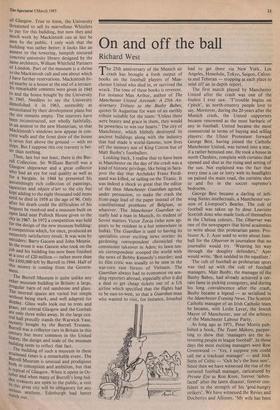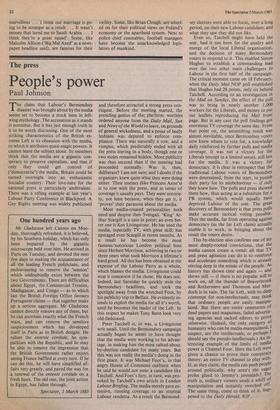On and off the ball
Richard West
/The 25th anniversary of the Munich air
crash has brought a fresh output of books on the football players of Man- chester United who died in, or survived the wreck. The tone of these books is reverent. For instance Max Arthur, author of The Manchester United Aircrash: A 25th An- niversary Tribute to the Busby Babes, quotes St Augustine for want of an earthly tribute suitable for the team: 'Unless there were beauty and grace in them, they would be powerless to win our hearts.' The city of Manchester, which blithely destroyed its ancient buildings along with the industry that had made it world-famous, now lives off the memory not of King Cotton but of Matt Busby's footballers.
Looking back, I realise that to have been in Manchester on the day of the crash was a kind of historic privilege, like being in Sara- jevo the day that Archduke Franz Ferdi- nand was killed, or sailing on the Titanic. It was indeed a shock so great that the editor of the then Manchester Guardian agreed, under persuasion, to make the crash the front-page lead of the paper instead of the constitutional problems of Belgium, or whatever. The Manchester Guardian ac- tually had a man in Munich, its student of Soviet matters Victor Zorza (who now ap- pears to be resident in a hut somewhere in India). The Guardian is used to having its specialists cover exciting news stories: its gardening correspondent chronicled the communist takeover in Aden; its lawn ten- nis correspondent scooped the world with the news of Bobby Kennedy's murder; and its film critic was usually to be seen in the war-torn rain forests of Vietnam. The Guardian always had to economise on sen- ding reporters abroad, especially after it did a deal to get cheap tickets out of a US airline which specified that the flights had to be east-to-west, so that a Guardian man who wanted to visit, for instance, Istanbul
had to get there via New York, Los Angeles, Honolulu, Tokyo, Saigon, Calcut- ta and Teheran — stopping at each place to send off an in-depth report.
The first match played by Manchester United after the crash was one of the foulest I ever saw. 'T'trouble begins on t'pitch', as north-country people love to say. Moreover, during the 20 years after the Munich crash, the United supporters became renowned as the most barbaric of any in football. United became the most commercial in terms of buying and selling players: the Ulster Protestant forward George Best, having joined the Catholic Manchester United, was turned into a star, if a rather bemused one. He took a house in north Cheshire, complete with curtains that opened and shut at the rising and setting of the sun. Not explained was the fact that every time a car or lorry with its headlights on passed the main road, the curtains shot to and fro in the soccer supremo's bedroom.
George Best became a darling of left- wing Sixties intellectuals, a Manchester' ver- sion of Liverpool's Beatles. The cult of football was taken up by dour Leavisite Scottish dons who made fools of themselves in the Chelsea colours. The Observer was one of the newspapers that hired academics to write about this proletarian game. Pro- fessor A. J. Ayer used to write about foot- ball for the Observer in journalese that no journalist would try. 'Weaving his way through the doughty defenders,' Ayer would write, 'Best nodded in the equaliser.'
The cult of football as proletarian sport was tied up with the cult of football managers. Matt Busby, the manager of the Busby Babes, had already achieved a cer- tain fame in picking youngsters, and during his long convalescence after the crash, Busby became a legend — as serialised in the Manchester Evening News. The Scottish Catholic manager of an Irish Catholic team he became, with Leslie Lever, the Jewish Mayor of Manchester, one of the arbiters of the Manchester Labour Party.
As long ago as 1971, Peter Morris pub- lished a book, The Team Makers, purpor- ting to show that 'managers are the in- teresting people in league football'. In those days the most exciting managers were Ron Greenwood — 'Yes, I suppose you could call me a tracksuit manager' — and Jock Stein of Celtic — 'Och he's the boss noo'. Since then we have witnessed the rise of the tortured football manager, caricatured by Private Eye as Ron Knee, forever 'ashen- faced' after the latest disaster, forever con- fident in the strength of his 'goal-hungry strikers'. We have witnessed the Revies and Dochertys and Allisons. 'My wife has been
marvellous ... I think our marriage is go- ing to be stronger as a result ... It wasn't money that lured me to Saudi Arabia ... I think they're a great squad'. Some, like Malcolm Allison (`Big Mal Axed' as a news- paper headline said), are famous for their virility. Some, like Brian Dough, are wheel- ed on for their political views on Poland's economy or the apartheid system. Next to police chief constables, football managers have become the unacknowledged legis- lators of mankind.















































 Previous page
Previous page